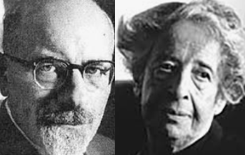 Deutscher’s Heretics and Arendt’s Pariahs: Between Jewish Particularity and Universality
Deutscher’s Heretics and Arendt’s Pariahs: Between Jewish Particularity and Universality
This essay will address the constitutive role of heresy in Jewish modernity. Heresy—defined here under the token of assimilation—is commonly considered as destructive to Jewish tradition. This work, in contrast, investigates Hannah Arendt’s writings on the figure of the Jewish pariah and Isaac Deutscher’s notion of the Non-Jewish Jew to locate a model of heresy in which the latter structures a new, modern Jewish tradition. In Deutscher, the analysis shows, the tradition of heresy is seen as leading to a universal worldview that eventually empties Judaism of any and all particular content. Arendt, on the other hand, connects the possibility of Jewish particularity in the present with her ideal of the pariah-as-heretic. Heresy is not a source of assimilation or rejection of Judaism, but rather offers a new foundation for Jewish particularity. The argument shows how the heresy of the pariah is also foundational to early formulations of Arendt’s politics of plurality.

